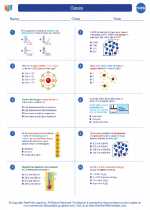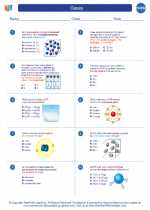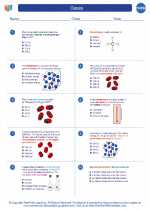Thermodynamics
Thermodynamics is the branch of physical science that deals with the relationships between heat, work, and energy. It is a fundamental concept in chemistry and physics, providing a framework for understanding the behavior of matter and energy in various systems.
Laws of Thermodynamics
There are four fundamental laws of thermodynamics, which serve as the foundation for the study of this field:
- Zeroth Law: If two systems are in thermal equilibrium with a third system, then they are in thermal equilibrium with each other.
- First Law (Law of Conservation of Energy): Energy cannot be created or destroyed, only converted from one form to another.
- Second Law: The total entropy of an isolated system can never decrease over time, and is constant if and only if all processes are reversible.
- Third Law: As the temperature approaches absolute zero, the entropy of a system approaches a minimum value.
Key Concepts in Thermodynamics
Some of the key concepts in thermodynamics include:
- Heat: The transfer of thermal energy between two bodies at different temperatures.
- Work: The transfer of energy through the action of a force over a distance.
- Enthalpy: A measure of the total energy of a system, including internal energy and the effects of pressure and volume.
- Entropy: A measure of the disorder or randomness of a system.
- Gibbs Free Energy: A measure of the potential for a chemical reaction to occur at a constant temperature and pressure.
Applications of Thermodynamics
Thermodynamics has wide-ranging applications in various fields, including:
- Chemical reactions and phase transitions
- Engine design and efficiency
- Power generation and energy storage
- Environmental science and sustainability
Study Guide
To understand thermodynamics, it is important to grasp the foundational principles and equations. Here are some key topics to focus on when studying thermodynamics:
- Understanding the laws of thermodynamics and their implications.
- Mastering the concepts of heat, work, and energy transfer.
- Learning to apply thermodynamic principles to chemical reactions and physical processes.
- Practicing the calculation of enthalpy, entropy, and Gibbs free energy.
- Exploring real-world applications of thermodynamics in engineering and environmental science.
By gaining a solid understanding of these foundational concepts and their applications, you will be well-equipped to tackle the complexities of thermodynamics in chemistry and related fields.
.


